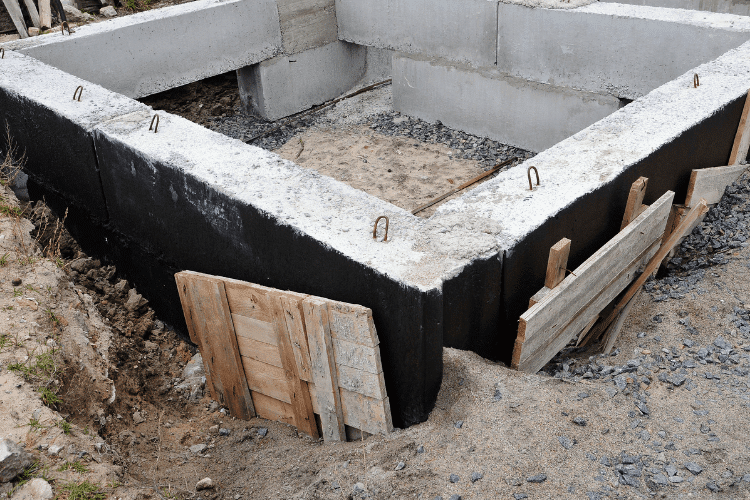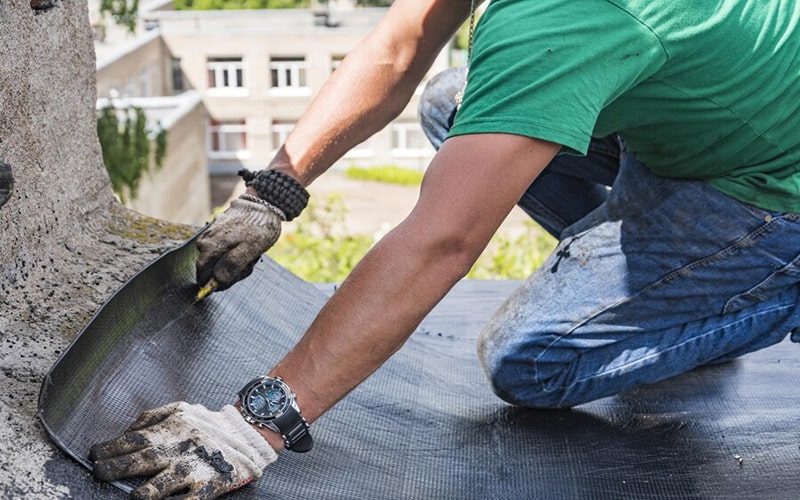Bitumen Coating Waterproofing
Welcome to the world of bitumen coating – a versatile solution that’s not just about protection but about making surfaces resilient against the wear and tear of everyday life. In this article, we’ll break down the basics of bitumen coating, explore where it fits in our daily surroundings, and understand how it contributes to making things last longer and stay robust.
Think of bitumen coating as a reliable shield, crafted from the essence of crude oil. Its magic lies in creating a protective layer that stands up against the forces of nature. We’re not talking about superheroes, but bitumen coating comes pretty close in its ability to ward off water damage and other environmental challenges.
This article is your guide to the world of bitumen-coated surfaces, where everyday structures – from your roof to pipelines – get an extra layer of defense. From resisting water and decomposing to adapting to various surfaces, bitumen coating is like a silent partner, ensuring that structures we encounter daily endure and thrive against the elements.
Stay with us as we unravel the advantages, dig into where bitumen coating is commonly applied, and uncover why it’s an essential player in the world of general waterproofing. This isn’t just about construction jargon; it’s about understanding a simple yet powerful solution that makes our daily surroundings more resilient in the face of daily challenges.
Get ready for a journey where everyday materials become heroes, and bitumen coating takes center stage as the unsung champion of durability. Whether it’s your home, office, or the local infrastructure, bitumen coating is silently at work, ensuring that things last longer, look better, and withstand the tests of time with grace.

Understanding Bitumen Coating: What is Bitumen Coating?
Beyond its fundamental role as a protective layer, bitumen coating is a versatile solution that finds applications across a range of surfaces, ranging from residential structures to industrial installations. The process involves the careful application of bitumen, a derivative of crude oil, to create a resilient barrier that shields surfaces against the detrimental effects of moisture, corrosion, and various environmental factors.
Bitumen, with its remarkable waterproofing properties, has become a go-to choice for addressing challenges posed by water intrusion. Its ability to form a seamless, resistant layer makes it particularly effective in preventing water from seeping into structures, be it roofs, walls, or other exposed surfaces. This waterproofing characteristic not only protects against immediate damage but also serves as a long-term defense, extending the lifespan of the underlying materials.
Moreover, the adaptability of bitumen coating is noteworthy. It adheres seamlessly to different types of surfaces, offering a universal solution for diverse applications. From concrete and metal to wood, bitumen coating provides a reliable defense, showcasing its versatility in meeting the unique needs of various projects. As an eco-friendly option derived from natural sources, bitumen coating aligns with maintainable practices in construction. Its application not only safeguards structures but also contributes to the overall durability of the built environment. In essence, bitumen coating transcends its role as a mere protective layer; it becomes a partner in enhancing the resilience and longevity of surfaces in both everyday and industrial settings. If you are in search of Pakistan’s best waterproofing companies, your quest ends here.
Applications in Industrial Manufacturing:
1. Storage Tanks and Containers:
Bitumen coating plays a pivotal role in safeguarding storage tanks and containers in industrial settings. Whether containing chemicals, fuels, or other substances, these structures are susceptible to corrosion and degradation over time. Bitumen coating creates a protective layer that shields against moisture and environmental factors, ensuring the integrity and longevity of storage facilities.
2. Concrete Structures and Foundations:
In the construction of industrial facilities, concrete structures and foundations are vital components. Bitumen coating provides an effective solution for enhancing the durability of these elements. By forming a resilient barrier, it guards against water penetration, minimizing the risk of concrete degradation and reinforcing the structural stability of buildings.
3. Equipment and Machinery Protection:
Industrial machinery and equipment are significant investments, and protecting them from the adverse effects of moisture and corrosive elements is crucial for maintaining operational efficiency. Bitumen coating acts as a reliable shield for various equipment, preventing rust and corrosion, thereby extending the lifespan and optimizing the performance of industrial machinery.
4. Bridges and Infrastructure:
The infrastructure, including bridges and overpasses, faces constant exposure to weather extremes and environmental pollutants. Bitumen coating proves invaluable in protecting these structures, offering a robust defense against corrosion and degradation. By incorporating bitumen-coated surfaces, the longevity of infrastructure components is significantly enhanced, reducing maintenance costs over time.
5. Underground Structures and Foundations:
Bitumen coating finds applications in protecting underground structures and foundations from water infiltration. Whether it’s tunnels, basements, or underground utilities, this coating acts as a reliable barrier, preventing water damage and ensuring the structural integrity of these below-ground components.
6. Corrosion Prevention in Marine Structures:
In maritime industries, where structures are exposed to saltwater and harsh marine environments, bitumen coating proves to be an effective corrosion prevention measure. Whether applied to ship decks, harbor structures, or offshore platforms, bitumen coating helps mitigate the corrosive impact of saltwater, contributing to the longevity and resilience of marine infrastructure.
These diverse applications showcase the versatility and effectiveness of bitumen coating across a spectrum of industrial scenarios, emphasizing its crucial role in preserving and enhancing the longevity of various structures and components.

Advantages of Bitumen Coating:
Thermal Insulation:
Bitumen coating not only provides a protective shield but also contributes to thermal insulation. In industrial settings where temperature variations are common, bitumen-coated surfaces act as a barrier, reducing heat transfer and enhancing energy efficiency. This additional benefit makes bitumen coating an attractive choice for structures requiring temperature regulation.
UV Resistance:
Exposure to ultraviolet (UV) radiation can degrade surfaces over time. Bitumen coating exhibits UV resistance, offering a layer of defense against the harmful effects of prolonged sun exposure. This feature is particularly valuable in outdoor applications, ensuring that coated surfaces maintain their structural integrity and aesthetic appeal in the face of constant sunlight exposure.
Chemical Resistance:
In industries where exposure to chemicals is prevalent, bitumen coating provides an additional layer of defense against corrosive substances. The chemical resistance of bitumen makes it suitable for surfaces in chemical plants, laboratories, and manufacturing facilities, where protection against corrosive agents is paramount for equipment and infrastructure.
Ease of Application and Maintenance:
Bitumen coating is known for its ease of application, offering a practical solution for various surfaces. Its liquid form allows for smooth application, ensuring even coverage. Additionally, maintenance is simplified, as repairs or reapplications can be carried out efficiently, minimizing downtime and associated costs in industrial operations.
Cost-Effectiveness:
From a financial perspective, bitumen coating proves to be a cost-effective solution for surface protection. Its longevity and resistance to various environmental factors contribute to reduced maintenance costs over the life cycle of structures. The initial investment in bitumen coating pays off in the form of extended durability and minimized repair expenses.
When selecting a bitumen coating, it’s essential to evaluate factors beyond its basic properties. Consideration should be given to the specific application method, required thickness, and the environmental conditions unique to the project. Collaborating with experienced professionals ensures that the chosen bitumen coating aligns perfectly with the project’s needs, guaranteeing optimal results and long-lasting protection.
Conclusion:
In conclusion, bitumen coating stands as a reliable and effective solution for waterproofing in industrial manufacturing. Its versatility, water resistance, and corrosion protection qualities make it a key player in enhancing the durability of structures and components. Consider integrating bitumen coating into your industrial processes to fortify against the challenges posed by water and environmental factors.
Whether you are involved in pipeline construction, structural engineering, or roofing projects, bitumen coating offers a robust defense against water-related issues, ensuring the longevity and reliability of your industrial assets.
In conclusion, the advantages of bitumen coating extend far beyond its basic protective qualities. Its multifaceted benefits, including thermal insulation, UV resistance, chemical resistance, and cost-effectiveness, make it a versatile and indispensable choice for a wide range of industrial applications. Understanding these advantages is crucial in harnessing the full potential of bitumen coating for enhancing the durability and performance of various surfaces in industrial settings.


